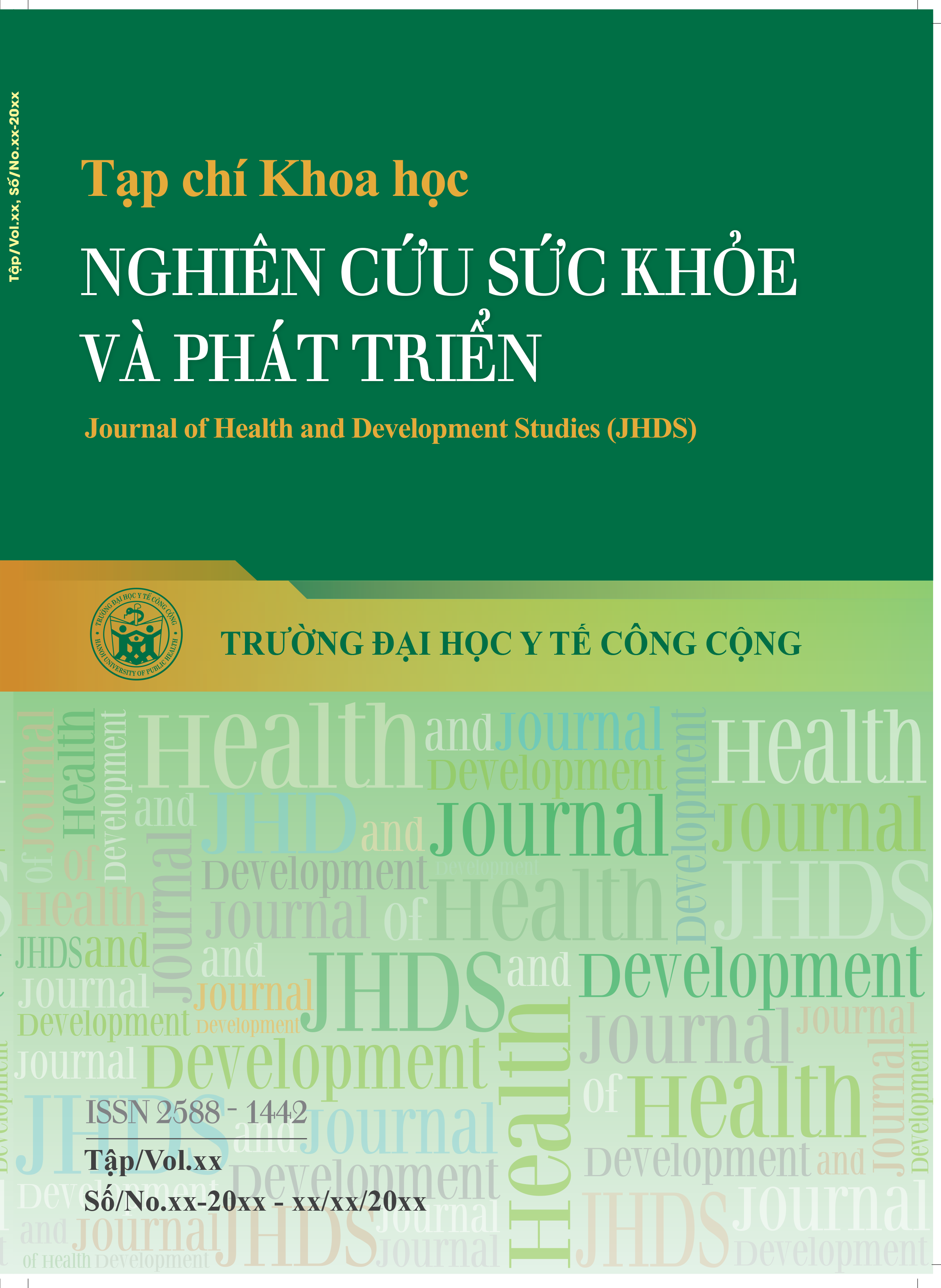Tạp chí
Khoa học Nghiên cứu Sức khỏe và Phát triển
(Journal of Health and Development Studies – JHDS)
Trường Đại học Y tế công cộng
ISSN (Print): 2588-1442
ISSN (Online): XXXX-XXXX
https://jhds.edu.vn
Self-reported social support at works among nurses and associated factors. Results from a cross-sectional study in a provincial hospital in 2020.
- Mã bài báo : SKPT_20_097
- Ngày xuất bản : 15/07/2021
- Số trang : 18-28
- Tác giả : Tran Thi Thu Thuy
- Lượt xem : ( 612 )
Danh sách tác giả (*)
- Tran Thi Thu Thuy 1 - Hanoi University of Public Health
- Nguyen Thi Huong 1 - Hoa Binh provincial hospital
- Nguyen Van Bang 2 - Vietnam Military Medical University
- Le Thi Thanh Xuan 3 - Hanoi Medical University
Objective: This study aimed to measure nurses' self-perceived social support and identify associated factors at one Vietnamese provincial hospital in 2020.
Methods: A cross-sectional study was implemented among clinical nurses of 22 treatment wards working at the hospital for over six months. Two hundred sixty-one nurses returned the self-reported questionnaires containing the Vietnamese 22-item Job Content Questionnaire and set of questions on personal and work characteristics. Descriptive analysis (frequency, mean, standard deviation), crude analysis (t-test and ANOVA), and multivariate linear regressions were conducted to describe the social support (i.e., supervisor' and co-worker's supports) and their associations with other factors at the significant level p less than 0.05.
Results: The study achieved a relatively high response rate (82.1%). Social supports, including supervisor and co-worker's supports, were 24.04, 11.89, and 12.16, respectively. Multivariate Linear regressions showed an inverse association of job demand and positive correlation of job control with both supervisor and co-workers' support among participating nurses (p<0.01). Older nurses, nurses with fewer years of work experience or fixed-term contract reported more perceived support from their superiors (p<0.05).
Conclusions: Nurses with different characteristics reported dissimilar perceived levels of social supports at work. Head nurses responsible for nursing management should encourage a supportive working environment where nurses can feel comfortable asking for and receive assistance from others. In addition, appropriate training would be helpful to increase nurses' recognition and usage of available resources at work.
- DOI : https://doi.org/10.38148/JHDS.0504SKPT20-097
- Chủ đề : Công tác xã hội
- Loại bài báo : Nghiên cứu gốc
- Chuyên nghành : Xã hội học
 Thông tin liên hệ : Tran Thi Thu Thuy
Thông tin liên hệ : Tran Thi Thu Thuy Email : tttt@huph.edu.vn
Email : tttt@huph.edu.vn Địa chỉ : Hanoi University of Public Health
Địa chỉ : Hanoi University of Public Health
Bài báo liên quan
- Respiratory symptoms and some related factors in waste collection workers at 2 branches in Hanoi, 2017
- Inpatients’ experience and the associated factors: A cross-sectional study at Lung hospital, Son La, in 2020
- People’s access to information and the practice of COVID-19 prevention during the first lockdown period in Hanoi in april, 2020
- Acceptability of applying asthma action plan for asthma patients at a hospital in Hochiminh City, Vietnam: an implementation research
- Quality of healthcare services and its related factors among inpatients in Ho Chi Minh Oncology hospital in 2020
- Job satisfaction and its associated factors of preventive medicine workers in northern Vietnam
- Situation of microbiological contamination in bottled drinking water products and some influencing factors in Hau Giang province in 2020
- Quality of periodic health examination service for employees and associated factors at the New Port Medical Center, Ho Chi Minh city in 2020
- Social support and related factors among the elderly in Thuy Bieu ward, Hue city
- Self-reported social support at works among nurses and associated factors. Results from a cross-sectional study in a provincial hospital in 2020.
- Students who are both victims and perpetrators of physical violence at a private high school in rural North Vietnam: Prevalence and Socio-Demographic Correlates
Bài viết mới nhất
- Một số trang web hữu ích đối với các nhà khoa học
- Dành cho chuyên gia
- Tạp chí Khoa học Nghiên cứu sức khỏe và Phát triển duyệt tối đa 1,0 điểm ngành Y trong Danh mục Tạp chí khoa học được tính điểm của Hội đồng giáo sư Nhà nước
- CHÚC MỪNG NGÀY BÁO CHÍ CÁCH MẠNG VIỆT NAM (21/6)
- GS.TS Hoàng Văn Minh - Hiệu trưởng Nhà trường 'lọt top' nhà khoa học có chỉ số trích dẫn hàng đầu thế giới

 File toàn văn
File toàn văn